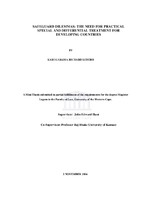| dc.description.abstract | Safeguards are among the most controversial of all trade remedies, due to the fact that they are contrary to the general principles of international fair trade as articulated in the various ageements governing the relationship between Members of the World Trade Organization (WTO). Thus, deeloping countries, least developed countries (LDC), South Africa, and other Sub-Saharan African countries, are hard-pressed to deploy and consider safeguards as an option. This thesis rests upon two central interlinked propositions, in essence a two-pronged argument and overarching statement of policy. First, the legal constraints on safeguards, many of which evolve out of the strict Appellate Body decicions, are reasonable on legal and policy grounds even though such controlling measures are applied likewise to fairly-traded and not just to unfairly-traded merchandise. Secondly, developing countries like South Africa should properly be accorded special and differential treatment to apply safeguards. | en_US |

